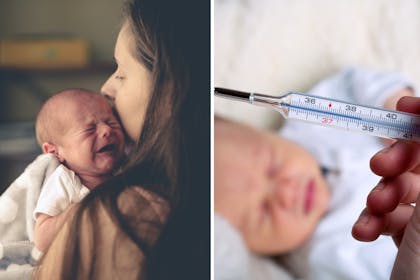New winter virus jab for babies could cut RSV hospitalisations by 80%

A groundbreaking study has found a single dose of nirsevimab could protect babies from Respiratory syncytial virus
A new winter virus jab could see baby hospital admissions for RSV reduce by up to 80%, scientists say.
Respiratory syncytial virus (RSV) affects 90% of children before they reach the age of two, often causing a mild cold-like illness.
But in the UK, more than 30,000 under fives are hospitalised with the virus annually – leading to 20 to 30 deaths.
FREE NEWBORN NAPPIES
Now, scientists have found the antibody treatment called nirsevimab could offer a solution after a study found a single dose provided immediate protection against chest infections for up to six months.
The study involved 8,000 children in the UK, France and Germany, up to the age of 12 months and dramatically reduced cases.
Scientists now want to see the jab added to the UK's baby vaccination schedule.
- 6 tips to save £1k by next Christmas
- Home Bargains launches new perfume dupes
- Try the 1p challenge to save £600 by Christmas 2024
- The perfect activity for families this Twixmas
- Asda's £16 dressing gown that looks 'identical' to White Company version
- Fans spot Giorgio Armani perfume dupe for just £12.50
Calls to add it to the routine childhood immunisation schedule
The jab is already being rolled out in the US and Spain and is being considered for a UK rollout, where it has been approved but not yet made available on the NHS.
The Joint Committee on Vaccination and Immunisation (JCVI), which advises the government, has said a cost-effective RSV immunisation programme should be developed for both infants and older adults.
'Major impact on hospital admissions in young children'
It says there are two options, either the antibody jab or an RSV vaccine given to pregnant women. The committee says either would make a major impact on hospital admissions in young children.
Unlike a vaccine, which prompts the body to create antibodies and takes a few weeks to be effective, nirsevimab gives immediate protection.
Prof Saul Faust, co-study leader at the University of Southampton and a consultant paediatrician, said: 'These latest results show that this long-acting antibody is safe and could protect thousands of babies from hospitalisation when used in conditions similar to routine clinical practice.
'It is really important information for the UK to help decide on options for the future national RSV immunisation programme.'
What is RSV?
RSV is a viral infection which for most children will will cause a mild cold, but it can be more harmful for babies, particularly little ones who were born prematurely.
According to the NHS, almost all children will be infected with by the time they are 2.
In older children and adults RSV can just cause a cold or cough but in young children, it can cause bronchiolitis which can lead to problems with feeding and even breathing.
Symptoms of RSV include:
- A runny or blocked nose
- A cough
- Sometimes a fever (a temperature of 38c or more)
Children can also sometimes get ear infections with RSV.
How do children catch RSV?
It can spread to children if an infected person coughs or sneezes and droplets enter the child's nose, eyes or mouth.
It can also be spread when a child has direct contact with the virus, including if someone who has RSV kisses the face of a child.
A child could also catch RSV if they touch a surface which has the virus on it – like a doorknob – and then touch their face or puts their hands in their mouth.
When should parents be worried?
Most cases of RSV can be treated at home but if you are worried about your child's cough or cold, you can ring the non-emergency NHS service on 111 or give your GP a call.
RSV is most severe in the elderly and babies under 1 as it can cause bronchiolitis and pneumonia, and hospitalisation.
Make sure you ring 999 if any of the following apply:
- Your child is having difficulty breathing – you may notice grunting noises or their tummy sucking under their ribs
- There are pauses when they breathe
- Their skin, tongue or lips are blue
- Your child is floppy and will not wake up or stay awake
Need advice?
Our health visitors and nursery nurses are online Monday to Friday evenings to answer your queries on feeding, sleep and child health.
Can lead to bronchiolitis
RSV is the leading cause of bronchiolitis in babies and young children.
Bronchiolitis is an infection that is mild for most babies, but in 2 to 3% of cases, symptoms are more severe and can lead to hospitalisation over breathing difficulties.
Early symptoms of bronchiolitis in babies, like RSV, are generally just a runny nose and a cough but can also include:
- A slightly raised temperature
- A rasping, persistent dry cough
- Difficulty feeding
- Fewer wet nappies
- Rapid or noisy breathing or wheezing
- Brief pauses in breathing
- Vomiting after feeding
Premature babies, those with heart or lung conditions and babies with weakened immune systems are most at risk of the more severe symptoms.
RSV season
RSV reason usually starts in October and lasts for 4 to 5 months with a peak in December.
Last season, figures were higher than usual which was said to be down to the Covid lockdowns of previous years as children weren't at school preventing RSV from spreading as usual.
Related stories
Chickenpox vaccine set to be offered on NHS for first time






